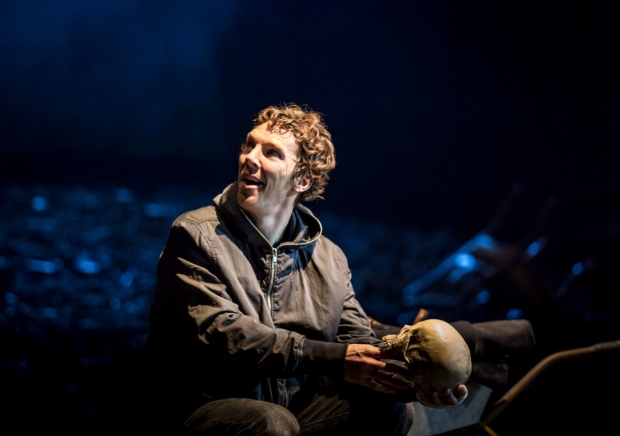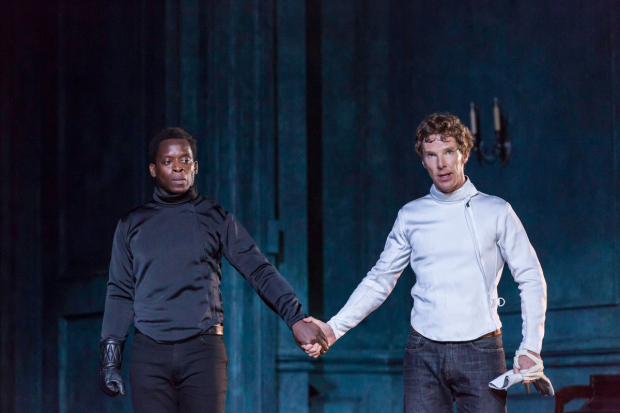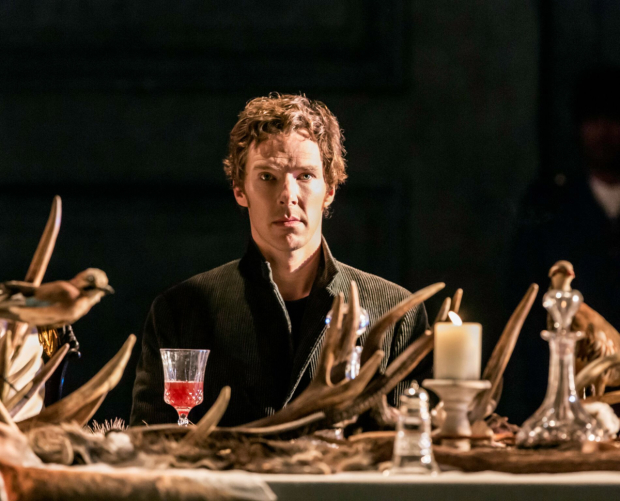Hamlet (Barbican) – 'Benedict Cumberbatch rings the changes'

© Johan Persson
And here's the rub: Benedict Cumberbatch delivers the great soliloquies superbly, urgently, intelligently and full of concentration, right to the top of the Barbican. He's not a "young" Hamlet, but he's a compelling and charismatic one, feigning his madness as a toy soldier in his playschool castle within the "real" castellated prison of Elsinore
Act 1, also seriously re-jigged, starts with him listening to Frank Sinatra singing "All of me" ("Why not take all of me… can't you see, I'm not good without you") on his gramophone, like a lovelorn patsy – but is he missing Ophelia or his dead dad? – and crying "Who's there?" (filched from the cut first scene on the battlements) to someone at the door – it's Horatio (Leo Bill), his college chum, complete with specs, checked shirt and back-pack.
This may sound as though Lyndsey Turner's production is a riot of radical irreverence, but it's nothing of the sort, alas. Great swathes of the play are collapsed – some of the court scenes, the Players' scenes, the Claudius/Laertes action from the return to Denmark through to the duel – and where alternative readings between the quartos are taken, they are made to work; Hamlet talks of "our philosophy" not yours, Horatio. But the narrative is no sharper for it.
'Cumberbatch rings the changes, and the confusion, through a dynamic propulsion'
Es Devlin's glorious design – the "time" of the play is indefinite, with a Prussian feel and a strikingly Estonian Fortinbras (Secret Theatre's Sergo Vares) at the head of the invading army – fills the Barbican stage with staircases, family portraits, tangled skeins of artificial flowers, and a toy theatre proscenium, brilliantly used for the play scene and the closet, where Polonius is stabbed behind the arras.
In the short second half, this arena is filled in with stones and rubble, a site of emotional and political devastation, as the army marches, Hamlet is deported in handcuffs, the ghostly gravedigger looms (Karl Johnson doubles cadaverously as the old king and the corporeal clown), and the world spins off its axis in chaos.

© Johan Persson
This momentum is well maintained through a startlingly short running time of just over three hours (why the rush? Is this with Broadway in mind, or the live screening on 15 October?), the interval conventionally taken deep into the fourth act as Claudius (a smoothly sinister, parch-voiced Ciarán Hinds) consigns his nephew to death in England.
And it's driven along by Cumberbatch leaping onto the banquet table on "O, that this too, too solid flesh would melt…"; giving notes to the Players on how to speak the speech, trippingly on the tongue; and making "How all occasions do inform against me" the centre of his performance and spur to his dull revenge at the prospect of imminent death for 20,000 men in a pointless war – "a fantasy and trick of fame" – going to their beds like graves.
You never once think he's vacillating, or cracking under the strain: he's learning about himself and the human condition, acquiring a spiritual grace and intellectual isolation that is more usually given in the character's sulky opening words in the second scene ("A little more than kin, and less than kind") and then justified; Cumberbatch rings the changes, and the confusion, through a dynamic propulsion.
But there are things in this version of the play that will never do. There's far too much inaudibility. The wider reaches of the story, the plot, involving Claudius and the court, are insufficiently clear. Norton's Polonius is too nebulous, and reading his "few precepts" from a notebook doesn't look good; he'd know them, and he's not funny.
Neither Hinds nor Anastasia Hille as Gertrude has reached fever pitch in performance (Turner is exposed as an inexperienced Shakespearean in the overall level of acting) and Hille really must put her fluttering hands away in the "willow grows askant the brook" speech.
Nothing growing "askant" about Siân Brooke herself, though, an exceptional Ophelia, recording – is she? – the detail of her life on a camera, like a digital age obsessive, cutting out reality; she sings well, too. But if you're going to have a piano on the stage, someone at some point must play it beautifully.
I like what Leo Bill does with his heavily cut Horatio, and Kobna Holdbrook-Smith tries hard with a similarly reduced Laertes. But Rosencrantz and Guildenstern are drearier than they need be, Osric is blanched out as a dull courtier (no hat banter), Ruairi Conaghan's Player King seems to have come from Out of Joint, not Thespian Towers. The curtain calls need work, too; they surely must improve with more self-belief and passion down the cast list.
Hamlet continues at the Barbican until 31 October 2015











